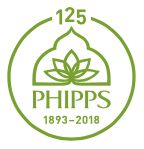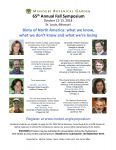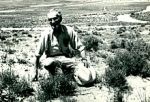News4th International Brachypodium ConferenceThe 4th International Brachypodium Conference is on 25-28 June 2019, in Huesca, Spain. You can visit our 4th IBC 2019 web site to get updated information on the conference. The registration period is open from January to May 2019. Life and Earth Sciences and Sustainable Global and Regional Development: International Symposium and Summer SchoolThe International Symposium and Summer Schools (AKTRU2019) is an interdisciplinary forum in education and research of various subject areas of life and earth sciences including studies of soil, atmosphere, biodiversity, climatology, geology, paleontology, glaciology with the specific focus on sustainable global and regional development. The AKTRU2019 will include three days symposium (July 8-10) to be held at tourist resort “Manzherok” at the Altai mountains followed by two Summer schools and research field trip organized by three Siberian universities. The international experts are invited to present research papers at the symposium and tutorial lectures at the Summer schools. Young researchers and students are welcome to present posters at the symposium and join the Summer schools. The Symposium topics will also cover several aspects of global and regional sustainability such as renewable energy and socio-economics of remote regions. Applications Sought for 2019 Special Projects GrantThe American Penstemon Society is once again seeking proposals for funding. The purpose of the APS Special Projects Program, $1000 maximum, is to stimulate activities that promote knowledge and appreciation of Penstemons. Many kinds of projects will be considered. In addition, APS provides a grant for graduate students, with funding up to $2000, whose research directly involves Penstemons. Community Input Requested: Extending U.S. Biodiversity Collections to Address National ChallengesA workshop held 30 October – 1 November 2018 at Oak Spring Garden in Upperville, VA under the leadership of the Biodiversity Collections Network (BCoN) addressed the future deployment of data held in U.S. biodiversity collections for research, policy and education. In their discussions, participants drew heavily on recent literature as well as surveys, meetings and workshops held over the past year with the stakeholder community of collections professionals, researchers, and educators. A report derived from the workshop and stakeholder outreach is now available for public comment. The comment period will be open until 5:00 PM Eastern on 1 February 2019. Please send your comments to Dr. Barbara Thiers at bthiers@nybg.org. A final version of the report will be issued in early February after user feedback is incorporated. For more information click here. Southern Appalachian Botanical Society Research GrantsResearch proposals are now being accepted for the 2019 Earl Core Student Research Award from the Southern Appalachian Botanical Society. The award provides up to $1,200 in support of student research projects in plant taxonomy, systematics, or ecology. Undergraduate and graduate students are eligible to apply, but the student and advisor must be members of SABS to be considered. More details and the application can be found at http://sabs.us/awards/earl-core-student-research-award/. Proposals are due by February 28, 2019 to be considered. Awards will be announced in April. 21st Installment of The Bee CourseIn Partnership with the American Museum of Natural History and the Southwestern Research Station, we are proud to announce the 21st installment of The Bee Course. The Bee Course is a ten day workshop held at the Southwestern Research Station in Portal, Arizona from August 18th through the 28th, 2019. The course is designed to provide biologists interested in pollinators with the tools and knowledge necessary to collect, process, and to begin to identify bee specimens. We encourage all interested parties to apply. For more information, including instructions on how to apply, a list of this year’s instructors, and course testimonials, please visit our new website at www.thebeecourse.org Celebrating Crop Diversity: Connecting Agriculture, Public Gardens, and SciencePlease join us at the World Food Prize Foundation and the Des Moines Botanical Garden for an exciting collaboration and upcoming symposium this spring: Celebrating Crop Diversity: Connecting Agriculture, Public Gardens, and Science Tuesday April 2 to Thursday April 4, 2019 Des Moines, Iowa Hosts: World Food Prize Foundation and Greater Des Moines Botanical Garden Prepare to kick-off visionary strategies and achieve far reaching targets when we bring together plant breeding and industry, public-garden based crop wild relative research, education, and outreach and germplasm repository communities! Sessions will address target lists and collections networks, conservation and breeding applications, food security, and social justice, all while inspiring scientists and educators to change the crop wild relative issue in our own backyards and globally! Receive tools for collaborations to bring cutting edge science into exhibits, build urban community inclusion through agriculture, address interpretation and engagement between universities and their gardens, and engage community youth in programs that actually lead to careers in agriculture, horticulture, or natural resource science. Evolution, Ecology, and Environment (E3 REU) - Undergraduate InternshipsAre you an undergraduate looking for a summer research opportunity in the broad fields of evolution, ecology, or environmental biology? Consider a new REU program based in the Dept. of Organismic and Evolutionary Biology (OEB) at Harvard. The program is called Evolution, Ecology, and Environment (E3 REU) and we will be welcoming our first group of interns summer of 2019. We are particularly interested in identifying underrepresented minority or first generation students who are interested in exploring research opportunities in evolution and ecology that might not otherwise be available at their home institution. Travel Award Applications for Life Discovery - Doing Science Education ConferenceAnnouncing Travel Awards for the 5th Life Discovery - Doing Science Education Conference. Applications are due on Jan 31, 2019. To increase the diversity of participants and institutions, funds are available to support educator travel and conference registration to the 2019 Life Discovery – Doing Science Education conference (LDC) These travel awards are made possible through support from our sponsors. Early Bird Registration deadline: Feb 15, 2019 Summer 2019 REU in Botany and Conservation BiologyThe Missouri Botanical Garden in St. Louis, MO will be offering an NSF-funded Research Experiences for Undergraduates summer program in 2019. Ten students will be chosen to participate in a ten-week program involving full-time work on an independent research project, with the guidance of a staff mentor, in addition to educational seminars, discussion sessions and field trips. NSF Seeks Community Input on Fundamental Biological ResearchThe National Science Foundation's (NSF) Directorate for Biological Sciences (BIO) is requesting input from the community on fundamental biological research questions and topics, specifically on the idea of creating “Integration Institutes for Cross-cutting Biology” to integrate diverse sub-disciplines of biology and support collaborative teams of researchers. NSF seeks ideas that span multiple levels of organization in living systems and require expertise from diverse biological subdisciplines. The deadline for submissions is March 1, 2019. The Request for Information is available here: https://www.nsf.gov/pubs/2019/nsf19027/nsf19027.jsp Botany in Action (BIA) Fellowship program Currently Accepting ProposalsPhipps Conservatory is currently accepting proposals for their Botany in Action (BIA) Fellowship program. BIA fosters the development of the next generation of plant-based scientists who are committed, first, to excellent research, and second, to educational outreach. Open to Ph.D. students enrolled at U.S. graduate institutions and conducting plant-based scientific research, the program provides each fellow with: 1) $5,000 for use towards research-related expenses at sites in the U.S. or abroad, 2) an all-expenses-paid trip to Phipps to engage in science outreach training and opportunities to translate and communicate their research to non-scientific, public audiences through written, visual and/or oral means, and 3) subsequent opportunities to connect their research with the public through programs, exhibits and other outreach venues. Click Here for more details. All proposal materials must be received by 11:59 p.m. EST on Fri., Jan. 11, 2019. Plant Molecular Biology Consortium 2018 - 2019 Seminar SeriesThe Plant Molecular Biology Consortium sponsors monthly seminars featuring nationally recognized academic and industrial plant scientists. Meetings are held from 4 to 6 p.m., beginning promptly at 4 p.m., at NCBiotech. Refreshments are served after the seminar. Download the 2018-2019 Seminar Series Flier. Doris Duke Conservation Scholars ProgramUniversity of California Santa Cruz Twenty early-undergraduate Scholars from around the country are selected to participate in a two-year conservation mentorship program centered on the summers between academic years. The goal of this program is to serve students from groups traditionally underrepresented in conservation, across disciplines, who can contribute to diversifying, redefining, and strengthening efforts to protect land. Efforts are focused on serving college freshmen, sophomores, and juniors with two years of college left at a stage when we can support their undergraduate careers and their choices as they graduate. The Conservation Scholars receive a $4,000 stipend each summer and become part of the national Doris Duke Conservation Scholars network for life. Students who attend or are transferring to any four-year institution in the US, its territories and Native nations are eligible. For more information, visit conservationscholars.ucsc.edu or email the Program Director, Dr. Justin Cummings, jacummin@ucsc.edu. Arnold Arboretum of Harvard University - Research Fellowships, Awards, and InternshipsThe Arnold Arboretum of Harvard University promotes and supports research consistent with its mission to discover and disseminate knowledge of the plant kingdom. To foster both independent and collaborative work, the Arboretum offers fellowships and awards to students, post-doctoral researchers, and professionals of the biological and horticultural sciences. Applicants are encouraged to define and develop paths of inquiry using the Arboretum’s resources, including its world-renowned living collection, herbarium, plant records, library and archives, greenhouse and laboratories, and the expertise of its staff. There is currently one fellowship, eight awards, and an internship program. Applicants must submit a research proposal online for the fellowship and awards by Feb 1, 2019. Applicants must apply for the internship program by March 1, 2019. Please see the website for the specific requirements of each award. Woods Hole Research Center: The Polaris Project - Summer Research OpportunityThe Polaris Project brings students to Alaska where they lead research to study the changing Arctic. The 2019 expedition is scheduled for approximately June 26-July 27 and will include two weeks of intensive fieldwork in the Yukon Kuskokwim Delta, AK followed by two weeks of analysis and synthesis at the Woods Hole Research Center (WHRC). This research opportunity is fully funded and provides a $3000 stipend. Students from any U.S. college or university are eligible to apply. More information about the program and application instructions can be found here: http://www.thepolarisproject.org/2019-polaris-application-materials/ Save The Date! The 23rd International Conference on Plant Growth SubstancesThe 23rd International Conference on Plant Growth Substances will take place on Jun 25-29 2019 at the Université Paris-Descartes in Paris, France. The International Plant Growth Substances Association (IPGSA) Conference welcomes researchers, academics and students from university and industry interested in the hormones, growth substances and signaling processes of plants. Visit www.ipgsa2019.com for more information. Anne S. Chatham Fellowship in Medicinal BotanyThe Garden Club of America’s Anne S. Chatham Fellowship in Medicinal Botany provides at least one grant award of $4,500 annually to support research related to medicinal plants. An important aspect of the award is that it is intended to enable a student to pursue an avenue of research that might otherwise prove closed. Accordingly, the funds may be used to cover direct costs associated with travel, field studies, or laboratory research. However, fellowship funds may not cover indirect costs, overhead, or student stipends and should not be used to pay for lab space or supplies normally provided by universities. 65th Annual Missouri Botanical Garden Fall Symposium“Biota of North America: what we know, what we don’t know and what we’re losing.” October 12-13, 2018 This year’s Symposium brings together a distinguished group of speakers actively working on increasing our understanding of species diversity and ecological interactions in North American ecosystems, as well the most pressing conservation issues they face. A surprising number and variety of North American species are quietly disappearing, yet scientists have only catalogued a small proportion of the total diversity of organisms. Our speakers will highlight the current status of our knowledge of North American species, showcase important ecological interactions at risk, and provide a perspective on future conservation actions. The program will be of interest to students of systematics, phylogeny, evolution, and conservation. Organizing committee: Monica Carlsen, Aaron Floden, Peter Hoch, and James Miller Training course in Tropical Field BotanyThe Missouri Botanical Garden (MBG), the New York Botanical Garden (NYBG), and the Universidad Estatal Amazónica (UEA) are pleased to announce a 3-week training program in Tropical Field Botany in Ecuador for highly motivated early graduate students from American universities who are interested in pursuing a career in Plant Systematics. Scientists from MBG, NYBG, and UEA will offer a broad introduction to the topics of tropical field botany and plant taxonomy through a variety of experiences, including classroom lectures, discussion sessions, and fieldwork. Drawing from the instructors’ personal research experiences, students will learn about the tools and methods used to understand and conduct research on Tropical Botany and the related topic of plant conservation. The Rupert Barneby Award of The New York Botanical GardenThe Rupert Barneby Award, named in honor of the late NYBG scientist and renowned legume expert, consists of US$2000 granted annually to assist researchers to visit The New York Botanical Garden to study the rich herbarium collection of Leguminosae. Graduate students and early career professionals with research in systematics and/or legume diversity are given special consideration. Projects that will result in the improved curation of the collection are desirable. Anyone interested in applying for the award should submit their: 1) curriculum vitae; 2) a proposal describing the project for which the award is sought; 3) contact information for two individuals who can vouch for the qualifications of the applicant. The proposal should address specifically the activities to be performed at NYBG and should consist of: 1) title page with proposal title, applicant’s name, address, and e-mail address; 2) body of the proposal of no more than two pages, including justification, objectives, and research plan; 3) literature cited; 4) travel budget. The application should be addressed to Dr. Benjamin M. Torke, Institute of Systematic Botany, The New York Botanical Garden, 1900 Southern Blvd., Bronx, NY 10458-5126, USA, and received no later than December 1, 2018. Submission by e-mail is preferred (send to: btorke@nybg.org). Announcement of the recipient will be made in January. Travel to NYBG should be planned for some period during 2019. Recipients are asked to give a presentation about their research. CBHL Literature Awards Recognize Excellence in Botanical and Horticultural LiteratureJune 21, 2018 – New York – The Council on Botanical and Horticultural Libraries, Inc. (CBHL) presented its nineteenth Annual Literature Awards on June 21, 2018. This presentation was made in Brooklyn during CBHL's 50th Annual Meeting hosted by the New York Botanical Garden and the Brooklyn Botanic Garden. The CBHL Annual Literature Awards, created to recognize significant contributions to the literature of botany and horticulture, this year honored four remarkable works. |

























